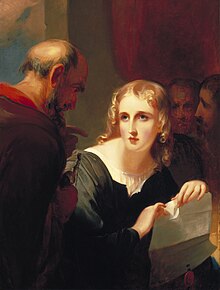Portia (The Merchant of Venice)
This article has multiple issues. Please help improve it or discuss these issues on the talk page. (Learn how and when to remove these template messages)
|
| Portia | |
|---|---|
| The Merchant of Venice character | |
 Kate Dolan as Portia (1886), by John Everett Millais | |
| Created by | William Shakespeare |
Portia is a female character and protagonist in The Merchant of Venice by William Shakespeare. In creating her character Shakespeare drew from the historical figure of Porcia,[1] the daughter of Cato the Younger, as well as several parts of the Bible.[2]
Portia is fond of proverbs, frequently quoting them, which was considered a sign of wisdom and sharp wit in the Elizabethan era. It has been suggested that the character of Portia was based on Queen Elizabeth, who was reigning at the time the play was written. [3]
Character

Portia is a wealthy heiress in Belmont. She is bound by the lottery set forth in her father's will, which gives potential suitors the chance to choose one of three caskets, made of gold, silver and lead, respectively. If they choose the correct casket – the casket containing Portia's portrait and a scroll – they win her hand in marriage. Portia is glad when two suitors, one driven by greed and another by vanity, fail to choose correctly. She favors Bassanio, a young but impoverished Venetian noble but is not allowed to give him any clues to assist him in his choice.
Later in the play, she disguises herself as a man and then assumes the role of a lawyer, Balthazar, whereby she saves the life of Bassanio's friend
The quality of mercy is not strained.
It droppeth as the gentle rain from heaven
Upon the place beneath. It is twice blest:
It blesseth him that gives and him that takes.

Despite Portia's lack of formal legal training, she wins her case with reference to the exact language of the law. She uses the tactics of what is sometimes called a Philadelphia lawyer in modern times and in doing so demonstrates that she is far from powerless, irrespective of her earlier lack of choice in the marriage. However, the concept of rhetoric and its abuse is also brought to light by Portia – highlighting the idea that an unjust argument may win through eloquence, loopholes and technicalities, regardless of the moral question at hand – and thus provoking the audience to consider that issue. Portia and Bassanio go on to live together along with the former's lady-in-waiting Nerissa and her husband Gratiano.
Portrayals

The strength of the role of Portia has made it attractive to many notable actresses. Frances Abington, Sarah Siddons and Elizabeth Whitlock all played Portia in the 18th century when actresses first started appearing on stage in performances of the play. More recently, the role has been depicted in the cinema, on television, and in theatres by a number of notable actresses such as Maggie Smith, Claire Bloom, Sybil Thorndike, Joan Plowright, Caroline John, Lynn Collins, Lily Rabe, and Gemma Jones.
Cultural references
The character of Portia has had a considerable and long-lived cultural impact.
- Abigail Adams adopted the pen name "Portia" in letters to her husband, John Adams, the second president of the United States. John signed his letters with "Lysander".[4]
- The New England School of Law was originally known as the Portia Law School when it was established in 1908 as a women-only law school and was known by that name until 1969.[5]
- In his Rumpole novels author John Mortimer has Rumpole call Phyllida Erskine-Brown (née Trant) the "Portia of our Chambers".[6]
- Georgina Weldon, the celebrated Victorian litigant and amateur soprano, was referred to as the "Portia of the Law Courts".[7]
- Portia is a moon of Uranus, one of several such named after Shakespearean characters.[8]
- Portia de Rossi (born Amanda Lee Rogers), married to Ellen DeGeneres, adopted the name Portia to reinvent herself after becoming a model and actress.[9]
- The masculine-sounding names tend to be more successful in a legal profession than otherwise identical counterparts, is named after the character.[10]
- Portia (given name), the history and usage of the given name
Notes and references
- ^ The Merchant of Venice 1.1/172–173, Folger Shakespeare Library
- ^ Drakakis 2011, pp. 163–164.
- ^ Leimberg 2011.
- ^ Hicks 2005, pp. 275–276.
- ^ New England Law n.d.
- ^ Kornstein 1993, p. 50.
- ^ Martin 2004.
- ^ Karkoschka 2001.
- ^ Kort 2005.
- ^ Delistraty 2014.
Sources
- Delistraty, Cody (30 July 2014). "Who Wins in the Name Game?". The Atlantic. Retrieved 19 October 2018.
- ISBN 9781903436813.
- Hicks, Philip (April 2005). "Portia and Marcia: Female Political Identity and the Historical Imagination, 1770–1800". JSTOR 3491602.
- ISSN 0019-1035.
- Kornstein, Daniel J. (1993). "Fie upon Your Law!". JSTOR 743391.
- Kort, Michele (29 August 2005). "Portia heart & soul". The Advocate. Here Media. Archived from the original on 26 May 2015. Retrieved 19 August 2015.
- Leimberg, Inge (2011). 'What May Words Say ... ?': A Reading of The Merchant of Venice. Fairleigh Dickinson University Press.
- Martin, John (2004). "Weldon [née Thomas], Georgina (1837–1914)". doi:10.1093/ref:odnb/53148. (Subscription or UK public library membershiprequired.)
- "Law School History". New England Law. Retrieved 19 August 2015.
External links
 Media related to Portia (The Merchant of Venice) at Wikimedia Commons
Media related to Portia (The Merchant of Venice) at Wikimedia Commons- All lines spoken by Portia, Folger Shakespeare Library
